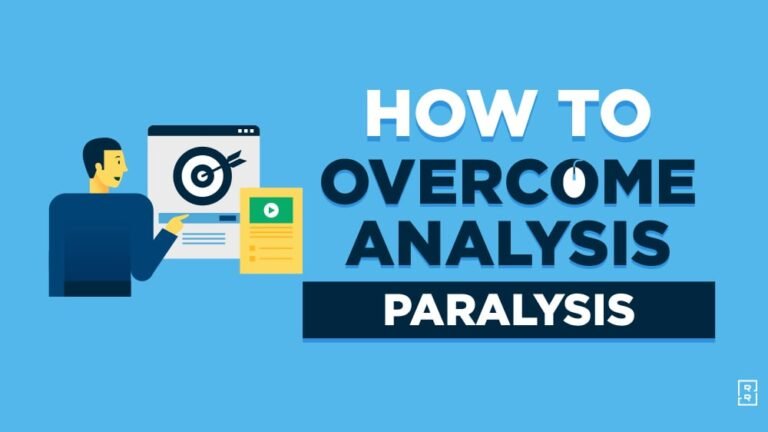We’ve all been there, teetering on the brink of starting a new project, only to find ourselves frozen, unable to take that crucial next step and get it off the ground. Whether it’s a blog, a podcast, a YouTube channel, or something else entirely… creating something new always comes with some low-key psychological hurdles that will be unique to you.
And believe me, I’ve been through it all. Impostor syndrome, fear of failure, self-doubt, anxieties about what the other people in your life will think when you start sharing your work.
The challenge I’m digging into today is analysis paralysis. It’s that debilitating situation where the fear of making the wrong choice leads you to make no choice at all. This is consistently one of the top factors I see holding back aspiring creators and entrepreneurs from pursuing their goals. And I’m not immune to it sometimes, myself.
As someone who spent most of my adult life working for myself, I’ve had my share of encounters with analysis paralysis. Well, today’s video is the beginning to share a heart to heart about why this is and more importantly, how we can lovingly work with ourselves to overcome this challenge.
Recognizing analysis paralysis when it occurs
So, you’re about to start a blog or podcast and you’re wondering, “Which platform and tools should I use?” or “which microphone is the best?” before you’ve even written a word or recorded a single episode. Days or weeks go by as you research, read, watch videos and think about what better movement will be.
That, my friend, is analysis paralysis in its natural setting. It’s easy to fall into this trap, especially when we aspire to do everything perfectly from the start. And for those of you (like me) who grew up with a healthy dose of perfectionism creeping up on you, I’m talking to you! 😅
There I was, tangled in the web of indecision, stalling on projects that meant the world to me. It’s a common theme for entrepreneurs—pursuing the perfect decision can quickly bog us down, especially when we’re embarking on something new.
How to overcome analysis paralysis in your life and work
If this psychological barrier is something you’ve struggled with in the past, start by aiming to shorten the time you spend in the land of indecision—instead of jumping straight into another absolute never feeling stuck again (just another form of perfectionism).
Here are some practical steps you can take to avoid falling into the trap of analysis paralysis for a long time next time.
1. Destruction of complex processes
The first step to overcoming analysis paralysis is to simplify. When faced with a new or difficult task, I break it down into manageable parts… and I find doing this by hand in a notebook or on a sheet of paper incredibly helpful.


By visualizing the exact actions you need to take, this approach helps clear the fog and makes the next task seem less daunting.
Break your overwhelming tasks into bite-sized pieces. For example, if you are starting a business, don’t try to do everything at once. Start with what you know and go from there.
2. Build confidence in your decision making
Confidence in your decision-making process starts with believing in your abilities and the skills you currently possess. You have made thousands of decisions in the past. why are you doubting yourself now? Build on your past successes to fuel your confidence.
The art of decision making is, in essence, the antidote to analysis paralysis. It involves recognizing when you’re stuck in the cycle of overthinking and giving yourself permission to choose the next step, no matter how small.
Here’s a tip: When you’re in analysis paralysis, take a moment to think about what’s holding you back. Often, it’s the fear of making the wrong choice. But remember, the beauty of entrepreneurship is its ability to adapt and evolve. Every decision brings learning opportunities and every action takes you one step closer to your goal.
3. Take incremental steps forward
What is the smallest step you can take right now that will bring you closer to your goal? Focus on that.
It is easier to decide on your first step than to map out the entire (expected) journey. And in fact, no matter how perfect Your plans seem like everything that happens between now and your future long-term goals will dramatically change the course of your path.
This is all about prioritizing progress over perfection.
Start with small steps that lead you gradually towards your goal. This strategy can be surprisingly effective in building momentum and trust.
4. Use deadlines and data from reliable sources
Setting a deadline can be a magic bullet for decision making.


Deadlines force you to make a choice with the information you have now, which, surprisingly, is almost always enough.
When deadlines are tight and you’re really banging your head against the wall, sometimes a fresh perspective is all you need to break out of analysis paralysis. Consult people you trust, but remember that the final decision is always yours.
5. Embrace imperfect decisions
Perfection is an illusion. Every decision carries some risk, but making an imperfect decision is often better than no decision at all. It’s like choosing to jump into the pool to learn to swim instead of waiting to become a perfect swimmer first.
The best tool you have is the one you have with you. Whether it’s a microphone, camera or any other piece of equipment, waiting for the perfect resource often means it doesn’t start at all. I learned that making do with what I have not only pushes me to take action, but also sparks creativity in ways I never imagined.
Yes, there may always be a better, more effective tool out there. But the key to progress? Start where you are with what you have. The journey to your goal begins with the willingness to use the resources available to you right now.
What is 1 small decision you can make today?
For entrepreneurs, there is no need to avoid the need to make decisions and take action. In fact, if you can cultivate the strengthening of one psychological skill to improve all of your creative projects and businesses for the rest of your life—the ability to make the next decision based on the information in front of you (without overthinking every possible alternative) is high on the list.
The analysis paralysis trap is real, but not insurmountable. Here’s a quick recap of my framework for escaping this trap:
- Break down complex processes into their smallest parts
- Start with the skills, equipment and knowledge you have today
- Cultivate inner confidence in your own decision-making skills
- Take the next incremental step ahead of you
Remember, the road to success is paved with decisions made and actions taken.
The next time you find yourself paralyzed by analyzing what the absolute best next step forward should be—take a deep breath, listen to your intuition, and take the next step.
The best way to learn and grow is to do. So what’s your next move?

